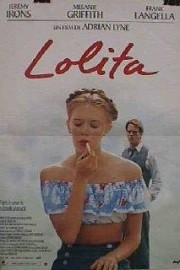Lolita
The story of Vladimir Nabokov’s “Lolita” is arguably the great tragedy of the late 20th century. It’s a story that captures one of the most controversial sexual fetishes of the century- the older man infatuated with a young woman- and turns it into uncompromising tragedy. When Stanley Kubrick got a hold of the story in 1962, he added an element of dark comedy that fell flat with me the first time (of course, the same thing happened with his “Dr. Strangelove,” but that’s a story for another time).
35 years later, Adrian Lyne returned the story to the realm of tragedy, but to middle America, it was still too much to handle, and no distributor would release it. In 1998, Showtime finally premiered it, and the film later got a limited run in theatres, which is how I first watched it.
Watching the film again, Lyne’s attention to the characters, and his more subtle blending of humor into the story, resonates stronger still. In a way, this is the film he’d been teasing us with over the years, with previous erotic dramas like “9 1/2 Weeks,” “Fatal Attraction,” and “Indecent Proposal,” with either the story or studio necessities getting in the way of capturing it (his 2002 drama “Unfaithful” was better and bolder, but still played it safe and conventional at times).
But his “Lolita” is without compromise, and its’ success stems largely from the performances by Jeremy Irons as our morally-corrupt narrator Humbert Humbert and Dominique Swain (in her first role) as Lolita, and a screenplay by Stephen Schiff that goes all the way in show their doomed romance and its’ psychological effects on them. By the time they’re on the road together- he having left his teaching position, her having left the prep school nearby- and a mysterious stranger is following them, their relationship is fractured. She is very much in control, and he is very much on the edge of his sanity. But the truth is that both of them are lost. Only an escape from Humbert’s grasp can save Lolita. But Humbert’s path is set from the moment he lays eyes of Lolita.
An important thing to realize, of course, is that Humbert’s sin isn’t just his infatuation with Lolita. His story began in 1921, when- as a boy of 14- he fell deeply in love with a girl of that age who died unexpectedly. So it’s not necessarily that Humbert is a pedophile in the way we think of them. He doesn’t actively chase just any underage girl. For him, Lolita represents something deeper, and more profound- a second chance at the love he lost as a young man. That’s why Humbert is less a monster and more a tragic figure, indeed, one of the most tragic in all of literature, and under Lyne’s watchful eye, film as well.
For Irons, this is one of his finest performances. For Swain, it’s a fantastic debut. There are other performances and characters worth mentioning of course- Melanie Griffith has never gotten her due credit as Lo’s man-hungry mother Charlotte (her reaction in particular to Humbert’s obsession is note-perfect), and Frank Langella is a haunting and mesmerizing presence as Clare Quilty (a playwright whose tastes are on-par with Humbert’s)- but Lyne’s focus on Humbert and Lolita is the soul of the film and heartbreaking to watch (especially when accompanied by Ennio Morricone’s lyrical and haunting score). Their fates seal our sympathies with both. Separated in distance, but Nabokov allows them a great irony and tragedy by what we read at the end, that neither will live on without the other. The result is a beautiful story of love lost, and opportunities missed due to obsession and choices made.










